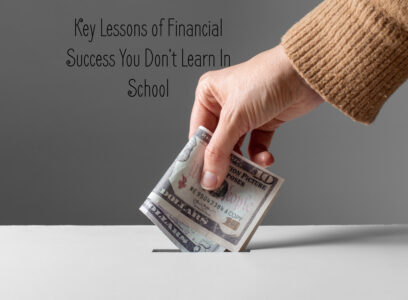Key Lessons of Financial Success You Don’t Learn in School
Most every American’s goal is to save enough money to enjoy their golden years of retirement, but how do we get there? And how can we enjoy life along the way? Some answers can be found in simple, consistent everyday steps. And we don’t mean just skipping your favorite Starbucks latte every morning, although it might. We have written about some of the key lessons every American who wants to achieve wealth accumulation should know. This article will show you the Key Lessons of Financial Success You Don’t Learn in School!
Keep time on your side
Long term growth and the accumulation of wealth happens over time. The more time you have, the more your money can grow. This is the value of compounding interest and arguably the most important key to investing. Compounding interest is the snowball effect of earnings you accumulate from earnings you already accumulated. For example, if you invest $1,000 today and your investment earns 5% per year at the end of year one you will have $1,050; at the end of year two $1,102.50.
You’ll earn an extra $2.50 on your investment because of interest earned in year one. That may not seem like a big deal but over the long-term compounding interest really makes a difference. If you let that $1,000 stay invested for 40 years at 5% you would have over $7,000. Now that’s not to say every year your investment will grow by 5%. A look at history tells us that some years the market has returned far more than 5% and some years far less than 5% which bring us to our next lesson.
The path isn’t always smooth & there will be bumps
If you already have an investment account, you will know that not every year achieves a positive return. The turbulent markets can and will have an unnerving effect on some people. Those who have learned the key lessons though, know this is the best time to dive in headfirst when you’re looking for long term growth. Economic, social, political and other factors cause the market to fall, temporarily. While some declines last longer than others, none of them have lasted forever.
Since the inception of the S&P 500 in 1957 (commonly referred to as “the market” as it tracks 500 American companies thought to encompass our economy); the S&P has returned a whopping 55,930% return1!! That means if you invested $100 in the S&P in 1957 & reinvested your dividends (dividends are payments made to investors), you could have over $56,000 today. It also means when the market declines and experiences a Bear Market, you don’t panic, sell your investments and hide the cash under your mattress where it earns no interest; and you more than likely lost much of the earnings you had accumulated thus far. Bringing us to the second most important lesson in investing.
Embrace the Bear when thinking long term (A Bear Market experiences prolonged declines)
In March of 2020, when Coronavirus seemed to bring the world to screeching halt, the S&P hit a low of nearly 2,200 points. But when the world didn’t actually come to a screeching halt, businesses found ways to stay open, and life carried on, the market climbed back up nearly 70% by year’s end2. The climb didn’t stop there either, by November of 2021, just 20 months later, the market had doubled from its March lows. A solid return if you invested your April 2020 tax return or any stimulus payments into an investment fund around this time.
The simplest way to embrace a bear market is to consistently add money to an investment account. For many people, the most accessible investment account is a workplace retirement plan such as a 401(k) or a 403(b). Adding money each week or every other week enables you to buy into the market at various prices, inadvertently purchasing more market share when the prices are lower during market downturns. This practice is commonly referred to as Dollar Cost Averaging. Dollar cost averaging is the practice of investing a set dollar amount at set intervals, consistently. This enables you to buy more shares when prices are lower and less shares when prices are higher. The long-term effects of this practice will be monumental on your wealth accumulation journey. But do be sure you have protected yourself from needing to access your invested funds in the short term.
Always keep some cash around
If you need your funds in the near future, you may not be able to weather the storm of a market decline. Keep some money close by where you can access it quickly, such as a bank savings account in case of emergency. You won’t make much in interest, but you won’t be losing money if you need some extra cash during a downturn. Keeping 3-6 months’ worth of living expenses in an easily accessible account is a must for those looking to accumulate wealth over the long term.
Paying some interest can be okay and could actually help you build wealth
Prioritize your debts by paying the highest interest rates first, especially credit cards. Lower interest rate debts, like a car loan or federal student loan, might seem enticing to pay off early; but paying that debt could cost you more money in the long run. In some cases, it could make sense to take extra money and invest it instead of applying an additional payment to these loans. History shows over the past 50 years the S&P 500 has returned an average of over 10%1 if you reinvest the dividends. Paying off your loan early means you could be losing out on earning higher interest somewhere else.
Protect your earnings potentials
Steady growth and investing are not possible if you aren’t able to earn a living. Your golden years of retirement will depend on you saving over your lifetime. A sudden illness or injury can be catastrophic to your long-term goals. Consider disability insurance to help keep the money coming in even when you aren’t able to work for a period of time. Many employers offer disability insurance to employees with premiums paid directly out of your paycheck. Plans differ in the amount of income they will provide and how long they will pay you, so be sure you know what you are buying.
Providing for your loved ones, even if you aren’t here
There are many Key Lessons of Financial Success You Don’t Learn in School and this is a very important one. We have all seen a tragedy strike a young family without a moment’s notice. The abrupt loss of a loved one is never easy, but for some families the life after a loss is unimaginable. End of life expenses and the loss of a second income can make it really hard on the living spouse, especially if they have children. Life insurance can help ease the burden and provide for your family after you’re gone. Instead of using saved funds to provide for everyday living expenses. Life insurance is generally tax free too so it can be a good way to provide for your heirs after you’re gone. Always consult an insurance professional as to which type of life insurance is best for you and your family.
Building Wealth is a Journey
Building wealth is a journey, it takes consistent steps every day to get you to the destination. The longer you save, the more your money can grow and the less you will need to save to get to your end goal. Putting savings off to another day, week or year will cost you and your future. The most important key to building your retirement is start early, even if it is less money contributed today than you think you could contribute tomorrow. Start young, start small & your dedication will be rewarded. You now know some very important key lessons to get you on the right track to wealth accumulation, the independence to enjoy your golden years of retirement, and every day in between.
We hope Key Lessons of Financial Success You Don’t Learn in School is very helpful! For other helpful articles, visit our website at RevolutionaryFP or follow us on Facebook www.facebook.com/TeamJonesHalliday
Written By: Jessica Wilson – Financial Advisor
Sponsored By: Revolutionary Financial Planning – An Office of Halliday Financial
Online Articles Referenced by Jessica Wilson – Financial Advisor
https://www.officialdata.org/us/stocks/s-p-500/1957
https://www.investopedia.com/ask/answers/041015/what-history-sp-500.asp
Securities-related transactions are managed by Halliday Financial’s subsidiary, Halliday Financial, LLC., Member FINRA and SIPC. The Company only transacts business in states where it is properly registered, or excluded or exempted from registration requirements. Past performance may not be indicative of future results. Therefore, no current or prospective client should assume that the future performance of any specific investment, investment strategy (including the investments and/or investment strategies recommended and/or purchased by adviser), or product made reference to directly or indirectly on this website, or indirectly via link to any unaffiliated third-party Website, will be profitable or equal to corresponding indicated performance levels.Different types of investment involve varying degrees of risk, and there can be no assurance that any specific investment will either be suitable or profitable for a client’s investment portfolio. No client or prospective client should assume that any information presented and/or made available on this website serves as the receipt of, or a substitute for, personalized individual advice from the adviser or any other investment professional. Historical performance results for investment indexes and/or categories generally do not reflect the deduction of transaction and/or custodial charges or the deduction of an investment-management fee, the incurrence of which would have the effect of decreasing historical performance results
Check out other articles at StockpilingMoms.com
Shelley is a boy mom, marine wife, and is blessed with an amazing family. She loves sharing recipes, travel reviews and tips that focus on helping busy families make memories.











This is great advice! I tell everyone all the time it is ok to pay some interest. This is easier with the younger generation but harder with the older generations.
This is a very important discussion! I am so glad we could share this!
I wish more than anything they would teach kids in school more about stuff like this!
I need to keep these tips in mind. I wish more lessons like this would be taught to kids. It would benefit them.
I have been telling our Board of Education they need to do teach more to our kids. Passing this along.
Thank you for sharing all these tips and for the reminder that it takes time. It doesn’t happen overnight.
These are great tips for financial success.
These are some great financial tips. I think the “keeping your loved ones secure even if you’re not there” is probably the most important in my eyes.
I always prioritise debts depending on the interest rate. I try to knock down or completely pay off the highest ones first.
I wish they this was taught in schools! It’s so important to have a good financial mindset/foundation to be financially successful. Thank you for sharing!!
Great financial tips! It’s really sad that schools don’t teach this and I’m a believer that it’s always good to keep cash on hand!
I wish that I had started investing at an earlier age but the money was not there. My middle son who is 22 is doing well in his job so he is investing.
Thanks for sharing these tips. I wish finances were taught more in schools.
These are great tips!
I wish that I invested more money when I was younger. Due to unforeseen circumstances, I have zero retirement and not sure how long I’ll be able to do contact work due to health issues.
I was not smart at investing when I was young and I wish I had. I guess it is never too late to start saving more!
Prioritizing debt is important. We paid off our credit card first because of the high interest.
I agree with Monica. Learning which debt has the highest interest rates is the first thing you should work to pay off. I’m trying to do this with my credit card and auto loan.
Definitely points I’ve thought long and hard over, over the years, but I am guilty of not sharing my thoughts with my children so it’s good to see articles on it to remind me that I really should have these conversations with my children and hopefully these points will be conversations they have with theirs.
These are all really great tips that I must remember! I’m surely going to take note of these thanks for sharing this with us!
These are lessons that everyone should know but it takes a while to learn them!
Compounding interest is our friend. This I must remember!!
These are great tips that should honestly be taught in school since they are really important. Thanks for sharing!
So much truth in one post! My personal favorite is the compound interest. Let yourobeynwork for us!
There are so many financial strategies that we don’t learn in school. These are all great points!
These are such great tips. We taught some of these to our young adult son. But I will have to share this article with him for him to learn the rest.
This is wonderful advice. I’ve been working on my budget as well and this information is so helpful to me. I do appericate you sharing this information with us.
Such great advice! We have been trying to add money to an investment account for a long time. I’ll keep these tips in mind always 🙂
Such great tips!! Our kids today need a whole different type of financial training. We took Financial Peace University and it made a huge difference for us. Only have the house left to pay off! 🙂
These are great tips for those considering investing their money.
These are all important things to know and learn when it comes to achieving financial freedom. I wish I knew these when I was younger.
This is such a great and very informative post! These are all really great tips! Thanks for sharing this with us!
Such an awesome article, worth our time to read and learn! It’s definitely an eye-opener to everyone about this financial advice for us to be financially stable in the years to come.
I can not wait until my husband and I have financial freedom! We will be making sure we keep this advice in mind!
I am always talking to people about finances, since I sell houses. I am shocked sometimes at what people do not know and the questions they ask. It is best to teach this young, but it is never too late to learn!
Investing is so confusing to me. I am young and a new Mom. I never know where to start or what I should have. Thank you for sharing this. It really makes me think.
I agree that investing is a long game. You have to be patient before you see gains.
These are very good common sense ideas for financial success.
We were just dicussing this the other day at lunch. Our kids are learning about the Roman Empire but they don’t know how to budget money. I taught my daugther how to balance a checkbook and how to count money back to people. I am shocked at the young people that can’t even count your change back to you. We have these discussions a lot! We as a family could do much better too!
Does this financial group work with people nation wide?
Please contact https://www.revolutionaryfp.com/contact-us or call 518-293-3312 for more information! Thank you for the question!
My biggest debt is student loans. They’ve just been consolidated but now the principal is higher from that act. I’m not sure I did the right thing. I wish I’d have known then, what I know now… I only use half of my degrees for the work I do. The others were unnecessary.
If these were taught in school our children would have a huge advantage, having financial planners in our family has been great, but it’s rare.
Thank you everyone for the nice comments and thoughts. I am so happy to hear everyone found this article helpful!! If you have more questions or would like to chat, please reach out to us or visit our website http://www.RevolutionaryFP.com. We do work with clients across the country.